Iran's Revolutionary Guards Conduct Suppression Drill In Tehran
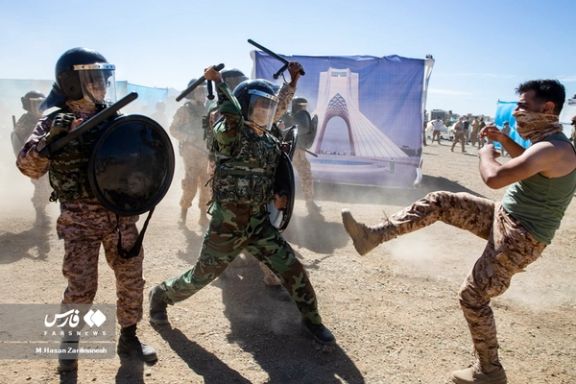
Over a year after the onset of nationwide protests in Iran, the Tehran Special Unit of the Revolutionary Guards conducted a drill aimed at suppressing dissent.

Over a year after the onset of nationwide protests in Iran, the Tehran Special Unit of the Revolutionary Guards conducted a drill aimed at suppressing dissent.
Official news agencies aligned with the government shared images and videos of the exercise, the final phase of which took place on Tuesday under the supervision of Hassan Hassanzadeh, commander of the IRGC Forces in Tehran.
"Defensive, security, and anti-terrorist operations in various urban environments were conducted with the aim of achieving 100% readiness," said a spokesman of the drills.
Hassan Hassanzadeh has faced sanctions from Western nations and some of their allies due to his active role in quelling the Women, Life, Freedom protests.
The drill took place amidst heightened tensions stemming from the case of Armita Geravand, a 16-year-old student who was admitted to the hospital after she lost consciousness in a subway car on October 1.
According to human rights organizations, she had a physical altercation with the Iranian morality police for her refusal to comply with compulsory hijab regulations. Three days later, she fell into a coma due to a "brain hemorrhage." Armita is still in a coma, and her family is being denied access by security forces.
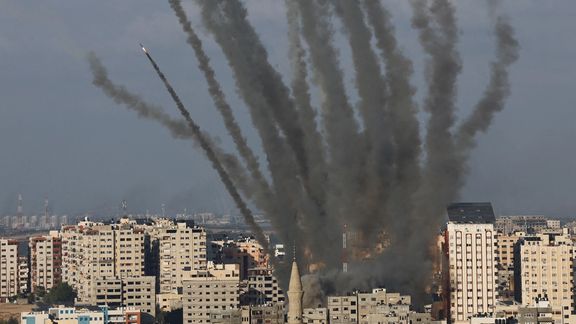
Tehran has taken a self-contradictory stance on the deadly Hamas attack, lauding it as a victory in their wish to uproot Israel, vowing more support to Gaza but saying Iran was not involved.
Iran’s ruler Ali Khamenei talked of “betting on the losing horse” in reference to regional countries, Saudi Arabia in particular, thawing relations with Israel mere days before the attack. The Supreme Leader and the Revolutionary Guards have also been providing money, weapons, military training and intelligence to militarize the Gaza Strip for years.
The regime was also so quick to install banners and billboards and hold street celebrations for the attack, that people started asking questions if they had been prepared for it. Hamas thanks Iran for support, and Iran reassures that they will get more but implies it had nothing to do with the operation.
In Iran, after Khamenei dictates the themes of the regime’s policy vis-a-vis global developments, other officials and clerics as well as his representatives across the country who are Friday Imams of the cities, start to promulgate them. The office of the Supreme Leader also produces media content to make sure other officials know the themes, such as the “losing horse,” that was made into a video clip and has also become a trendy hashtag in cybersphere by the regime’s online soldiers.
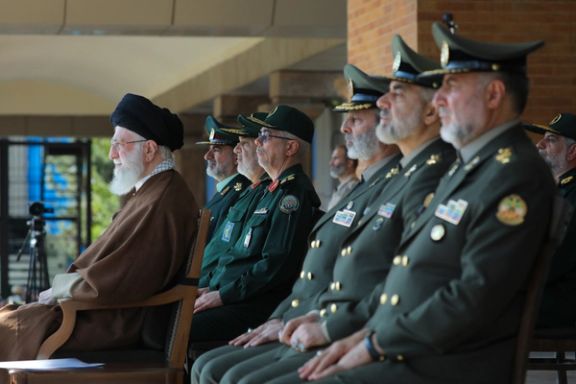
In addition to Khamenei and President Ebrahim Raisi other senior politicians have been vocal in adulation of the attack. About three days into the war that started with Hamas killing about a thousand Israelis, injuring several thousands, and taking scores as hostages, firebrand cleric Ahmad Khatami, one of Tehran’s Friday Prayer Imams, talked of the regime’s promise of annihilation of Israel and described the attack as “heroic” on Tuesday. "We send a message to the governments that are moving towards normalizing relations with Israel that this path is a dead-end,” he said.
Hossein Noori Hamedani, a conservative grand ayatollah in Iran, said, "Islamic countries should not think of normalizing relations with a country that cannot protect itself and has a government on the brink of collapse."
Mohammad Sadat, the head of the Islamic Development Coordination Council in Kordestan province, not only congratulated Khamenei for the Hamas attack but also threatened that more extensive attacks on Israel would occur. He added, "This prideful operation was a warning to the hegemonic countries."
Congratulations to Hamas came from Abdolnabi Mousavi-Fard, Khamenei’s man in Khuzestan province, stating that "Hamas has executed brilliant scenes of resistance and steadfastness." He added, "The firing of thousands of rockets and missiles at Israel is a blessing of the presence of Khamenei and the school of Qasem Soleimani." As the commander of IRGC’s Quds extraterritorial force, Soleimani was the architect of Iran’s proxy warfare in the region. He was killed by a US drone attack in 2020.
Even officials known to be critical of the regime, such as reformist heavyweight Mohammad Khatami, have hailed the attack as “a significant achievement for the Palestinian people.”
As the international community continues to denounce the Hamas invasion, Iranian officials are openly encouraging Palestinians to escalate their efforts.
Ali Fadavi, the deputy commander-in-chief of the Islamic Revolutionary Guard Corps (IRGC), described Hamas's attack on Israel as "historic" and stated, "The Islamic Republic has played an effective role in boosting the spirit of resistance and battle." The ‘resistance’ is the term the Islamic Republic regime calls its logistic, financial and intelligence support for the militia groups in the region, several of which were created by Iran.
Mohammad Baqeri, the chairman of the chiefs of staff of the Iranian armed forces, claimed it would not be long before Palestinian youth succeeded in liberating the Al-Aqsa Mosque from what he referred to as "the Zionist enemy." He slammed the ongoing normalization attempts between Israel and Arab nations as a "plot" to prevent the collapse of the Jewish state, saying it “could neither halt nor delay the inevitable decline of Israel".
Iran is not shy about its support for the groups. Parliament Speaker Mohammad-Bagher Ghalibaf said on Tuesday, "There is no doubt that we will stand by them in realizing the aspirations of the Palestinian people and taking the necessary measures." Shahriar Heydari, the deputy chairman of the National Security Committee of the Iranian Parliament, told Didbaniran website that "the Islamic Republic provides training to Palestinian fighters, and we assist in military training." He added, "As long as the people and fighters of Palestine need the Islamic Republic, we try to meet those needs."
Iran has supported various regional militant groups over the years including Hamas, which receives around $100 million in aid each year in addition to the provision of weaponry and financial resources for its operations. Naser Kanaani, spokesperson for the Iranian Ministry of Foreign Affairs, reiterated claims that the Palestinian group had launched the attack independently, adding that the accusations against Iran were politically motivated.
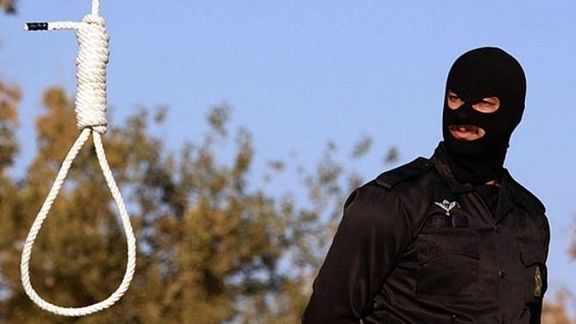
The number of executions in Iran have surged by 24% in the last year with at least 659 carried out since last October.
The revelations come from a report compiled by the US-based Human Rights Activists News Agency (HRANA), identifying the provinces of Alborz, Sistan and Baluchestan, and Kerman as the primary locations where most of these executions occurred.
According to HRANA's data, the period from October 10, 2022, to October 8, 2023, said seven of the executions took place in public settings. The report highlights a disturbing trend of escalating executions in the country, as evidenced by a comparison with the statistics of the past three years.
Zahedan Prison in Sunni Province of Sistan and Baluchestan emerges as one of the facilities with the highest number of executions, recording 60 executions in total. Of those executed in the past year, nearly 57 percent faced charges related to "drug-related crimes," while 35 percent were executed for "murder."
The report also underscores that approximately three percent of the executed individuals in Iran during the past year faced charges associated with politics, security, and religious beliefs. It further draws attention to the execution of at least seven individuals who were arrested during the Women, Life, Freedom protests.
The widespread issuance and execution of death sentences in Iran are occurring at a time when many of the accused lack access to fair trials, the ability to choose their legal representation, and the right to a proper defense.
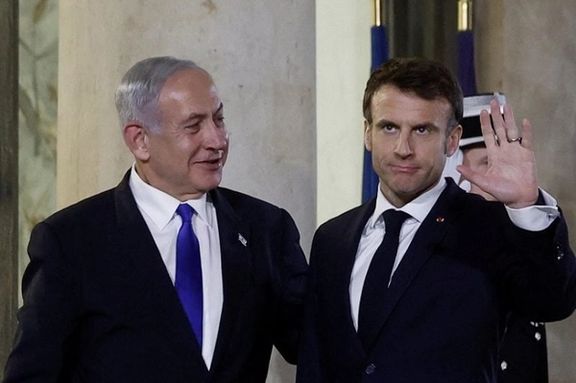
French President Emmanuel Macron said on Tuesday that Iran's condoning of Hamas' attack on Israel was unacceptable, and that France was looking into whether it was directly involved.
"I have no comment to make about the direct involvement of Iran for which we have no formal proof, but it's clear that the public comments by Iranian authorities were unacceptable... and that it is likely that Hamas was offered help," Macron said.
"But I will remain careful on that point until we have stabilized intelligence," he added in a news conference with German Chancellor Olaf Scholz.
Macron and Scholz both emphasized Israel's right to defend itself against attacks on its territory.
"I hope the next days will allow Israel to put an end to any attack against Israel's territory and free the hostages", Macron said.
Iranian authorities immediately ordered celebrations as the attack was unfolding on October 7, and both top officials and state-controlled media praised those involved in the terror attack.
On Tuesday, Iran’s ruler Ali Khamenei at a military ceremony declared, “We salute the foreheads and arms of the ingenious and intelligent Palestinian designers and the young people. But those who claim that the recent victory belongs to non-Palestinians have miscalculated.”
There have been media reports of Iran’s direct involvement in preparing the Hamas attack, although governments have so far insisted, they have no definitive evidence.
Asked whether Europe should end all financial aid to Palestinians in response to Hamas' attack on Israel last weekend, Macron declined, saying: "One must not confound the fight against terrorism with the most essential humanitarian rights to support the civilian population."
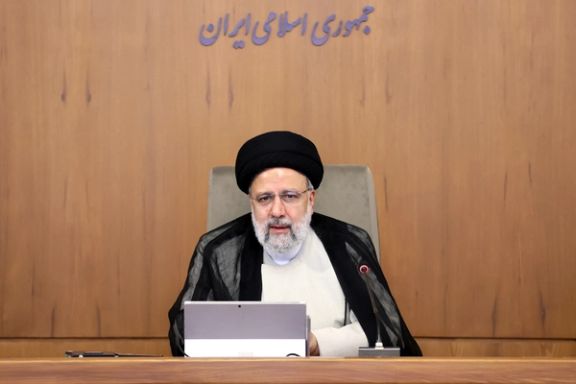
President Ebrahim Raisi joined Iran's ruler Ali Khamenei in extending his congratulations to Hamas, praising the militants for their "courage, bravery, resistance, and initiative."
Operation Al Aqsa Storm saw hundreds of Hamas militants enter Israel by land, sea and air on Saturday morning, accompanied by a bombardment which has seen more than 900 killed, thousands injured and well over 100 kidnapped into Gaza, including women and children.
Raisi said: "Their resistance in this glorious operation is exemplary. The determination of the young Palestinians has created a great epic and demonstrated that oppressing a nation, displacing people, and occupying their land may last for a while, but it infuriates the oppressed people, and they are no longer willing to endure the oppression. I hope God helps the fighters in liberating their land."
Iran has long supported various Palestinian militant groups, including Hamas and Palestinian Islamic Jihad, with the largest beneficiary being Hamas, which governs the Gaza Strip.
On Monday, the Islamic Republic denied allegations implicating it in the recent terrorist incursion into Israel, despite Hamas expressing gratitude to Tehran for its support. Naser Kanaani, spokesperson for the Iranian Ministry of Foreign Affairs, asserted that the Palestinians had conducted the attack independently and stressed that accusations against Iran were politically motivated.
Meanwhile, nations including the UK and US have expressed full support for Israel after the surprise assault, the US already giving military support.
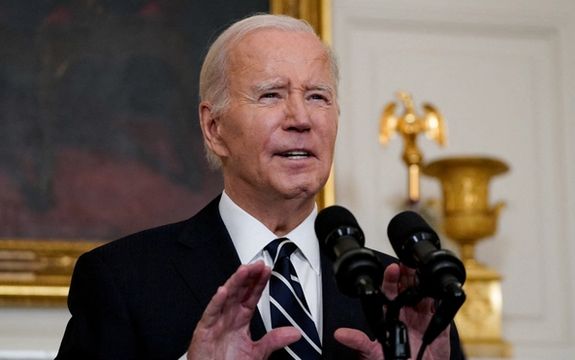
Hamas’ attack on Israel has reignited the US Republicans’ charge on the White House.
As the casualties soar and the US ‘adversaries’ smirk, critics of the Biden administration boil in anger and disgust.
“Nine Americans are dead, an unknown number are missing or held hostage, yet President Biden is nowhere to be seen and has nothing to say,” Senator Tom Cotton wrote on X. “He’s totally overmatched by events and paralyzed in a crisis, partly because his own foolish appeasement of Iran fueled a campaign of terror.”
Not surprisingly, Biden’s Iran policy is a common attack line.
The administration’s secret talks in search of an informal nuclear deal with the Iranian regime was never popular in Washington. Releasing $6 billion of frozen assets as part of the ‘prisoner swap’ was even less popular. And hiring someone with deep, longstanding ties with Tehran for a senior role in the Pentagon was almost universally disapproved.
But then came the unprecedented attack on Israel from a group supported by Iran, which took everything to the next level. More than 900 Israelis have been killed in the attacks.
“The Saturday attack was really an Iranian attack on Israel, using Hamas as a surrogate,” opined John Bolton on X. “The Biden Administration should get a spine and pin the blame on Tehran where it belongs.”
John Bolton is no friend of the ayatollahs, of course. He has been pushing for regime change in Iran for two decades at least. But this time his calls may find more willing ears than ever.
There’s no clear evidence that the Iranian regime had a direct role in the attacks on Israel. This is the official line –from both Tehran and Washington. But it seems to have convinced no one.
“The Biden administration hasn’t acknowledged Iran’s involvement in Hamas’s terrorism because it would be an indictment of the administration’s disastrous concessions to Iran,” Senator Cotton again.
And Mike Pompeo, former Secretary of State, whom the Islamic Republic reportedly wanted to assassinate: “Make no mistake: this is at its core about historic efforts by Iran to wipe Israel off the face of the earth.”
Pompeo’s remarks could’ve been shrugged off as personal vendetta, had it not been echoed by the Supreme Leader of the Islamic Republic himself.
“God willing,” he was quoted on his official X account, “the cancer of the usurper Zionist regime will be eradicated at the hands of the Palestinian people and the Resistance forces throughout the region.”
Some believe the Iranian regime is hoping for another US military entanglement in the Middle East. One involving others, of course. It’s a smart plan. But any miscalculation could prove costly.
As Israeli forces gear up for what seems to be a large-scale ground operation in Gaza, the US is dispatching aircraft carriers to the region.
The Biden administration does not seem to be looking for military confrontation with Iran. But he may have to do something meaningful to fight off the constant accusations of ‘appeasement’ in an election year.
In the past few weeks, the ‘Iran influence scandal’ has further eroded Biden’s shaky approval rates. His administration has done little to address concerns about the US Iran Envoy, Robert Malley, whose security clearance has been taken away while the FBI investigates his ‘handling’ of classified information.
The Republicans see Malley as a promising pressure point. They have been pushing it for a few months now, and they are likely to push it harder after the attack on Israel.
“Biden’s Special Envoy Rob Malley hired and placed Iranian assets in government positions with access to classified information,” wrote Rep. Claudia Tenney on X, “Congress must investigate whether any classified information provided by these Iranian assets was used in planning this horrific invasion of Israel.”